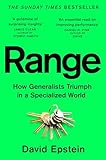Range book summary

There's a lot of pressure in society today to get a head start and specialise early in life. This book tries to make the counter-argument against this notion. Here's are my recollections and key takeaways from the book.
Learning environments
- There are 2 types of learning environments: (i) kind and (ii) wicked.
- In kind learning and functioning environments, conditions are controlled and limited. An example of this is a chess game. In these environments, deep expertise and repeated, deliberate practice will allow you to excel. In these situations:
- Be a world-class specialist.
- Be able to recognise patterns and move by intuition.
- In wicked learning and functioning environments, learning more broadly, allowing yourself to sample different paths before diving deeper and being able to abstract learnings from one field and apply it to the right situation in another. will allow you to better thrive. Wicked environments are complex and unpredictable. In these situations:
- Be a world-class generalist.
- Take a step back, assess the bigger picture, then apply the best solution. Utilise strategic thinking.
The argument for experimentation and learning slowly
- Experimentation is as reliable a route to expertise as early specialisation (i.e. don't worry about the lack of head-start).
- Our complex world has increased the average human's IQ and abstract thinking skills with each new generation.
- We are better at making connections between abstract thoughts and ideas compared to before, but we insist on narrowing our conceptual focus.
- As AI becomes more intelligent, we should consider reversing this.
- When embarking on a learning journey, if the path is too quick and easy at the start, it may be a sign that you are not optimising learning for long-term retention.
- Consider learning broadly initially, before specialising.
- Regularly test yourself as part of the learning journey. It is in the difficulty of recall where you retain the most information.
- Increase spacing between tests to make it harder.
- Interleaving and learning under different conditions creates knowledge flexibility.
- People's personalities change a lot over the course of their lives, and especially over the period from teenage years to late 20s. There's therefore an argument that we should spend this time exploring different roles, jobs and industries, picking up broad skills and knowledge, before specialising.
- There are numerous famous examples of people who have excelled later in life, in spite of, or arguably, because of the many different jobs / roles they had taken earlier on in life e.g. Vincent van Gogh. It's rare we hear of these stories because society seems to think stopping / starting / quiting / taking the indirect route, shows a lack of discipline / passion.
- If you try something and feel it's not working, stop and figure out your next best options. There's no point in pushing on when a role is not matched for you. Note that this does not mean quitting early if it gets hard.
- The sunk cost fallacy in this context is that we find it very difficult to leave a job or career because we've already invested our time into it. If we are not enjoying it, or if it doesn't match well with what we want to do, this should not matter.
- The key thing is to continually learning and take the next best step based on the options you have at that time.
Having broad interests and knowledge help with problem solving, innovation and generating new ideas
- Analogies are useful tools in helping to understand and communicate new concepts
- They can also be extremely helpful in solving problems, especially if the analogy is derived from a different field and multiple analogies are used.
- Humans do not seem particularly good at knowing how to use analogies effectively because they are trained to focus deep on specific domains. Learning broadly across different fields may help increase the use of analogies (taken from other fields) when faced with new problems.
- Concept of a "hedgehog" vs "foxy" way of thinking
- When coming across new information, hedgehogs double down on what they believe. Foxes update their world view.
- "Hedgehogs reach for formulaic solutions to ill-defined problems. Outcomes do not matter; they were proven right by both successes and failures, and burrowed further into their ideas. It made them outstanding at predicting the past, but dart-throwing chimps at predicting the future."
- A group of generalists with broad knowledge were able to predict with more accuracy, the future outcome in a complex system compared to the so-called domain experts of that field.
- There have been various examples of innovators who have created new products after being inspired or importing ideas from other fields and/or interests. It is also not unusual for an innovator to have mostly "failed" before getting their major breakthrough. e.g Thomas Edison.
- The progress we've made have been due to the "importing and exporting" of ideas from one field to another.
- Teams with a greater diversity of backgrounds and experiences are more creative when coming up with solutions.
Summary
- Embrace range, experiment widely, be open-minded and scientifically curious.
- The world is a complex system i.e. wicked in nature. New major innovations will come from generalists who are able to span disciplines and connect abstract ideas.
- “Compare yourself to yourself yesterday, not to younger people who aren’t you.”